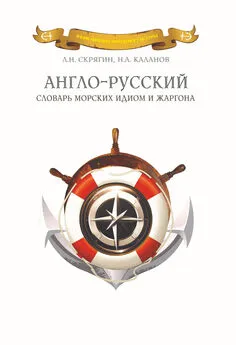Adam Makkai - Словарь американских идиом: 8000 единиц
- Название:Словарь американских идиом: 8000 единиц
- Автор:
- Жанр:
- Издательство:неизвестно
- Год:неизвестен
- ISBN:нет данных
- Рейтинг:
- Избранное:Добавить в избранное
-
Отзывы:
-
Ваша оценка:
Adam Makkai - Словарь американских идиом: 8000 единиц краткое содержание
Это обновленное и дополненное издание, содержащее более 8000 идиоматических
слов и выражений, причем каждое из которых снабжено грамматическим объяснением
и практическим примером. Словарь содержит лексемные идиомы, фразеологические
единицы и поговорки, имеющие особенное значение. В нем приведены наиболее
употребительные выражения только американского английского языка. Этот словарь — идеальное пособие для студентов, часто разъезжающих бизнесменов и просто
путешественников.
Словарь американских идиом: 8000 единиц - читать онлайн бесплатно полную версию (весь текст целиком)
Интервал:
Закладка:
[land of nod] {n. phr.} Sleep. •/ The little girl went off to the land of nod. /
[land on]See: JUMP ON.
[land on one’s feet]also [land on both feet] {v. phr.} , {informal} To get yourself out of trouble without damage or injury and sometimes with a gain; be successful no matter what happens. •/ No matter what trouble he gets into, he always seems to land on his feet. / •/ Mary lost her first job because she was always late to work, but she landed on her feet and soon had a better job. /
[landslide] {n.} An overwhelming victory during a political election. •/ Ronald Reagan won the election of 1980 in a landslide. /
[lane]See: LOVERS' LANE.
[lap]See: IN THE LAP OF LUXURY, IN THE LAP OF THE GODS.
[lap up] {v.} 1. To eat or drink with the tip of the tongue. •/ The kitten laps up its milk. / 2. {informal} To take in eagerly. •/ She flatters him all the time and he just laps it up. / •/ William is interested in rockets and space, and he laps up all he can read about them. / Syn.: EAT UP(3).
[lardhead] {n.} , {slang} A stupid or slow-witted person. •/ You’ll never convince Donald; he’s a lardhead. /
[large]See: AT LARGE, BY AND LARGE.
[large as life]See: BIG AS LIFE.
[large-eyed]See: ROUND-EYED.
[large order] {n. phr.} Difficult job; a difficult task to fulfill. •/ It is a large order to educate three children in college at the same time. / Compare: TALL ORDER.
[lash]See: TONGUE LASHING.
[lash out] {v.} 1. To kick. •/ The horse lashed out at the man behind him. / 2. To try suddenly to hit. •/ The woman lashed out at the crowd with her umbrella. / 3. To attack with words. •/ The senator lashed out at the administration. / •/ The school newspaper lashed out at the unfriendly way some students treated the visiting team. /
[last]See: AT LAST, EVERY LAST MAN, EVERY SINGLE or EVERY LAST, FIRST AND LAST, HE LAUGHS BEST WHO LAUGHS LAST, HAVE THE LAST LAUGH, ON ONE’S LAST LEGS, TILL THE LAST GUN IS FIRED or UNTIL THE LAST GUN IS FIRED.
[last but not least] {adv. phr.} In the last place but not the least important. •/ Billy will bring sandwiches, Alice will bring cake, Susan will bring cookies, John will bring potato chips, and last but not least, Sally will bring the lemonade. /
[last ditch] {n.} The last place that can be defended; the last resort. •/ They will fight reform to the last ditch. /
[last-ditch] {adj.} Made or done as a last chance to keep from losing or tailing. •/ He threw away his cigarettes in a last-ditch effort to stop smoking. / Compare: BACK TO THE WALL.
[last-ditch effort]See: LAST DITCH.
[last lap] {n. phr.} The final stage. •/ Although the trip had been very interesting, we were glad that we were on the last lap of our tiring journey. / See: LAST LEG.
[last laugh]See: HAVE THE LAST LAUGH.
[last leg] {n. phr.} 1. Final stages of physical weakness before dying. •/ The poor old man was on his last leg in the nursing home. / 2. The final stage of a journey. •/ The last leg of our round-the-world trip was Paris to Chicago. / See: LAST LAP.
[last out] {v.} 1. To be enough until the end of. •/ There is enough food in the house to last out the snowstorm. / •/ Our candies won’t last out the night. / 2. To continue to the end of; continue to live after; live or go through. •/ The old man is dying; he won’t last out the night. / •/ This car will never last out the winter. / Compare: HOLD OUT.
[last stand] {n. phr.} See: LAST DITCH.
[last straw]or [straw that breaks the camel’s back] {n. phr.} A small trouble which follows other troubles and makes one lose patience and be unable to bear them. •/ Bill had a bad day in school yesterday. He lost his knife on the way home, then he fell down, and when he broke a shoe lace, that was the last straw and he began to cry. / •/ Mary didn’t like it when the other girls said she was proud and lazy, but when they said she told fibs it was the straw that broke the camel’s back and she told the teacher. /
[last word] {n.} 1. The last remark in an argument. •/ I never win an argument with her. She always has the last word. / 2. The final say in deciding something. •/ The superintendent has the last word in ordering new desks. / 3. {informal} The most modern thing. •/ Mrs. Green’s stove is the last word in stoves. /
[latch on]or [hitch onto] {v.} , {informal} 1. To get hold of; grasp or grab; catch. •/ He looked for something to latch onto and keep from falling. / •/ The football player latched onto a pass. / 2. {slang} To get into your possession. •/ The banker latched onto a thousand shares of stock. / 3. {slang} To understand. •/ The teacher explained the idea of jet engines until the students latched onto it. / Syn.: CATCH ON. 4. {informal} To keep; to hold. •/ The poor woman latched onto the little money she had left. / 5. {slang} To stay with; not leave. •/ Marie and Dick wanted to go to the movies by themselves, but Mane’s little brother latched onto them. /
[latch string] {n.} 1. A string that opens an old-fashioned door by lifting a small bar. •/ The early settlers kept the latch string outside the door when they were working around the house, but at night they pulled it to the inside. / 2. {informal} A warm welcome; a friendly greeting. — Used in such phrases as "the latch string is out." •/ Mary has her latch siring out for everyone who comes. / Syn.: WELCOME MAT(2).
[late]See: BETTER LATE THAN NEVER, OF LATE.
[lately]See: JOHNNY-COME-LATELY.
[later]See: SOONER OR LATER.
[later on] {adv.} Later; not now. •/ Finish your lessons. Later on, we may have a surprise. / •/ Bill couldn’t stand on his head when school started, but later on he learned how. /
[lather]See: IN A LATHER.
[laugh]See: HE LAUGHS BEST WHO LAUGHS LAST, HAVE THE LAST LAUGH.
[laugh all the way to the bank] {v. phr.} To have made a substantial amount of money either by lucky investment or by some fraudulent deal and rejoice over one’s gains. •/ If you had done what I suggested, you, too, could be laughing all the way to the bank. /
[laughing matter] {n.} A funny happening; a silly situation. — Usually used with "no". •/ John’s failing the test is no laughing matter! / •/ We were amused when our neighbor’s cat had five kittens, but when our own cat had six kittens it was no laughing matter. /
[laugh in one’s beard]See: LAUGH UP ONE’S SLEEVE.
[laugh in one’s sleeve]See: LAUGH UP ONE’S SLEEVE.
[laugh off] {v.} To dismiss with a laugh as not important or not serious; not take seriously. •/ He had a bad fall while ice skating but he laughed it off. / •/ You can’t laugh off a ticket for speeding. / Compare: MAKE LIGHT OF.
[laugh one out of] {v. phr.} To cause another to forget his/her worries and sorrows by joking. •/ Jack was worried about getting airsick, but his son and daughter laughed him out of it. /
[laugh one’s head off] {v. phr.} , {informal} To laugh very hard; be unable to stop laughing. •/ Paul’s stories are so wildly funny that I laugh my head off whenever he starts telling one of them. /
[laugh on the wrong side of one’s mouth]or [laugh on the other side of one’s mouth]or [laugh out of the other side of one’s mouth] {v. phr.} , {informal} To be made sorry; to feel annoyance or disappointment; cry. •/ Paul boasted that he was a good skater, but after he fell, he laughed out of the other side of his mouth. /
[laugh up one’s sleeve]or [laugh in one’s sleeve]or [laugh in one’s beard]To be amused but not show it; hide your laughter. •/ He was laughing up his sleeve when Joe answered the phone because he knew the call would he a joke. /
[launch window] {n.} , {Space English} , {informal} 1. A period of time when the line-up of planets, Sun, and Moon are such as to make favorable conditions for a specific space launch. •/ The mission was canceled until the next launch window which will be exactly six weeks from today. / 2. A favorable time for starting some kind of ambitious adventure. •/ My next launch window for a European trip isn’t until school is over in June. /
[laurel]See: LOOK TO ONE’S LAURELS, REST ON ONE’S LAURELS.
[lavender]See: LAY OUT(7).
[law]See: LAY DOWN THE LAW, PARLIAMENTARY LAW, TAKE THE LAW INTO ONE’S OWN HANDS.
[law-abiding] {adj.} Obeying or following the law. •/ Michael had been a law-abiding citizen all his life. /
[lawful age]See: LEGAL AGE.
[law of averages] {n. phr.} The idea that you can’t win all the time or lose all the time. •/ The Celtics have won 10 games in a row but the law of averages will catch up with them soon. /
[law unto oneself] {n. phr.} , {literary} A person who does only what he wishes; a person who ignores or breaks the law when he doesn’t like it. •/ Everybody in Germany feared Hitler because he was a law unto himself. / •/ Mr. Brown told Johnny that he must stop trying to be a law unto himself. / Compare: TAKE THE LAW INTO ONE’S OWN HANDS.
[lay]See: KILL THE GOOSE THAT LAID THE GOLDEN EGG.
[lay about one] {v. phr.} To hit out in all directions. — Used with a reflexive object: "her", "him", or "them". •/ The bandits surrounded the sheriff, but he laid about him so hard, with his gun used as a club, that they stepped back and let him escape. / •/ Mrs. Franklin didn’t kill the mouse, but she laid about her so hard with the broom that she scared it away. /
[lay a finger on] {v. phr.} To touch or bother, even a little. — Used in negative, interrogative, and conditional sentences. •/ Don’t you dare lay a finger on the vase! / •/ Suppose Billy fakes his brother with him; wilt the mean, tough boy down the street dare lay a finger on him? / •/ If you so much as lay a finger on my boy, I’ll call the police. / Compare: LAY HANDS ON, PUT ONE’S FINGER ON.
Читать дальшеИнтервал:
Закладка:







